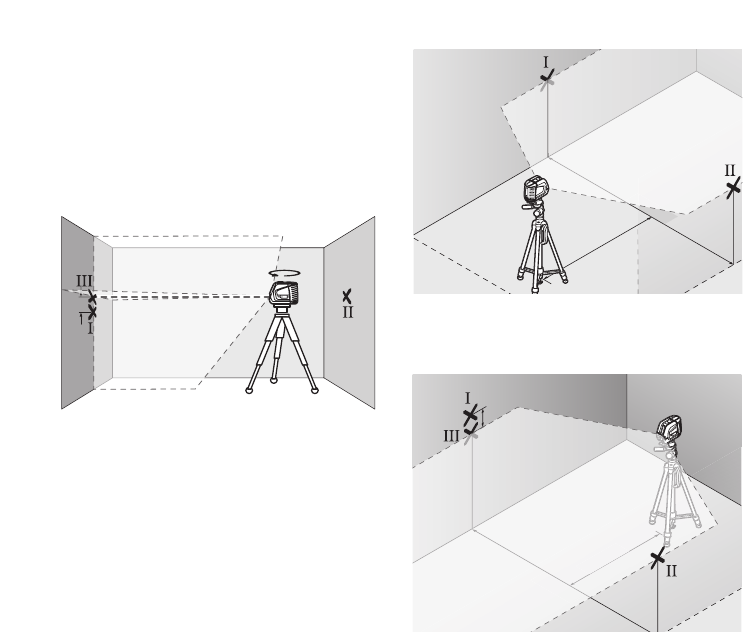
-11-
– Without turning the tool, position it close to
wall B. Switch the tool on and allow it to
level in.
– Align the height of the tool (using a tripod
or by underlaying, if required) in such a
manner that the cross point of the laser
lines is projected against the previously
marked point II on the wall B.
– Without changing the height, turn around
the tool by 180°. Direct it against the wall A
in such a manner that the vertical laser line
ru
ns through the already marked point I.
Allow the tool to level in and mark the the
cross point of the laser lines on the wall
A (point III).
– The difference d of both marked points I
and III on wall A indicates the actual height
deviation of the tool.
The maximum permitted deviation dmax is
calculated as follows:
dmax = double distance of the walls x 0.0036
mm/m Example: With a 26 ft distance
between the walls, the maxim
um deviation
must not exceed dmax = 2 x 26 ft x 0.0036
in/ft = 3/16 In. (0.188in) Thus, the marks
must not be more than 3/16 of an inch apart.
Checking the Leveling Accuracy of the
Horizontal Line
For the check, a free surface of approx.
26 x 26 ft is required.
– Set up the tool on a firm, level surface
between both walls A and B. Allow the
tool to level in while in horizontal
operation.
– At a distance of 13 ft from the measuring
tool, mark the centre of the laser line (point
I on wall A and point II on wall B) on
b
oth walls.
– Set up the tool 26 ft away turned by 180°
and allow it to level in.
– Align the height of the tool(using a tripod
or by underlaying, if required) in such a
manner that the center of the laser line is
projected exactly against the previously
marked point II on wall B.
– Mark the center of the laser line as point III
(vertically above or below point I) on the
wall A.
– The difference d of both marked points I
and III on wall A indicates the actual
deviation of the tool from the level plane.
The maximum permitted deviation dmax is
calculated as follows:
dmax = double distance of the walls x 0.3
mm/m
Example: With a 26 ft distance between the
walls, the maximum deviation must not
exceed dmax = 2 x 26 m x 0.0036 in/ft = 3/16
in. Thus, the marks must not be more than
3/16 in apart.
13 ft
2
A
B
26ft
26ft
d
A
B
13 ft
26 ft
d
180˚
A
B


















